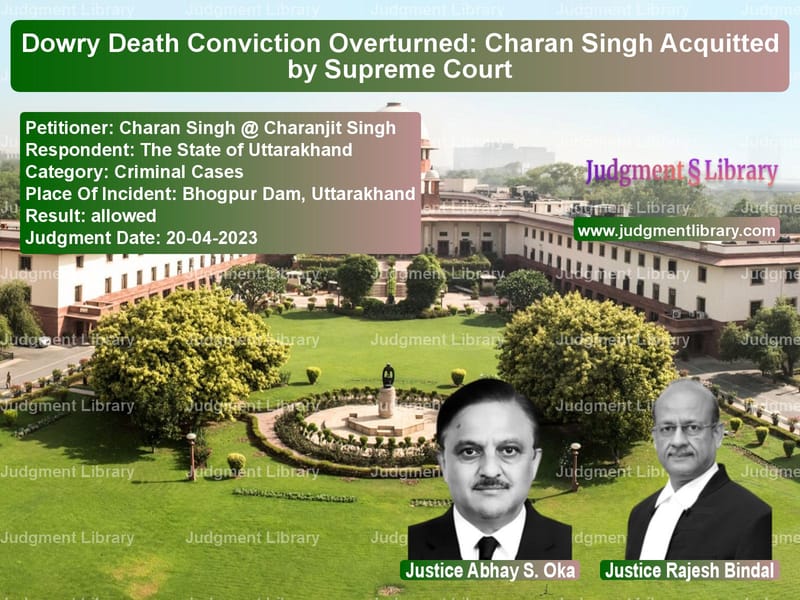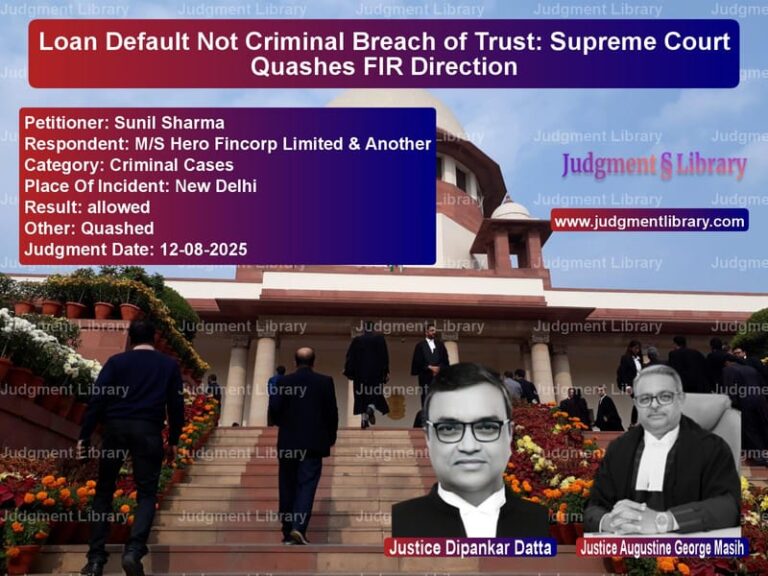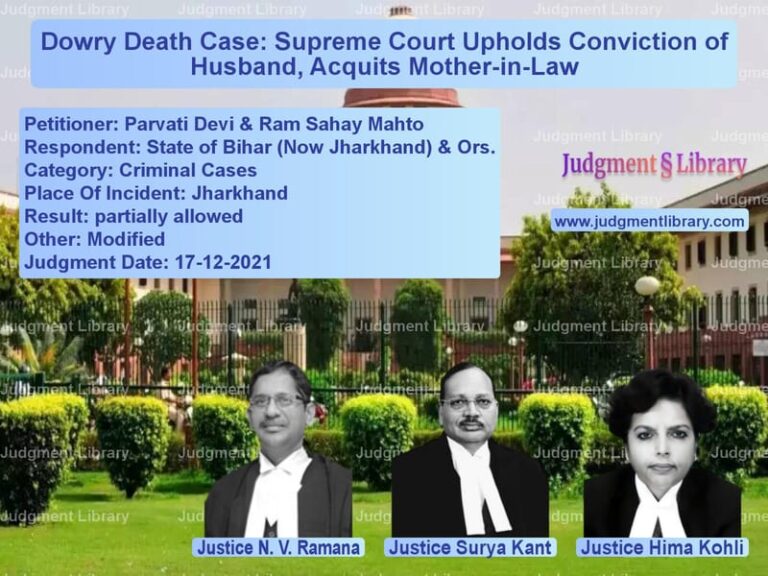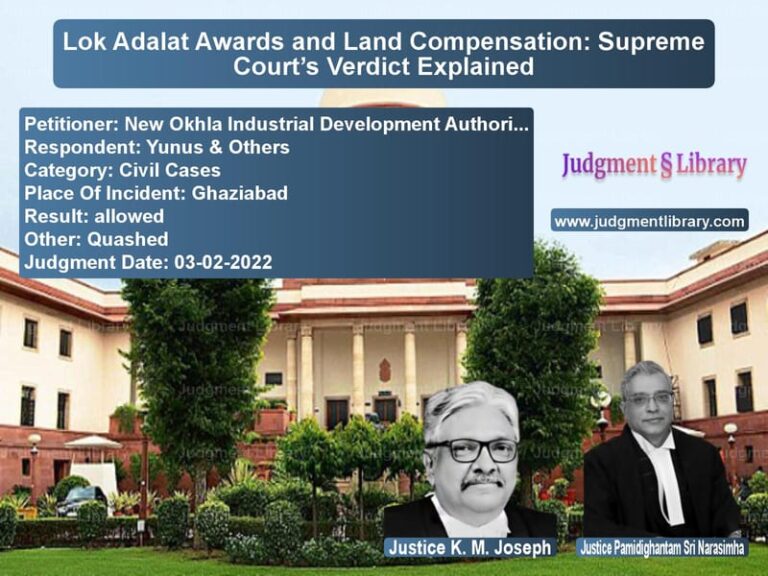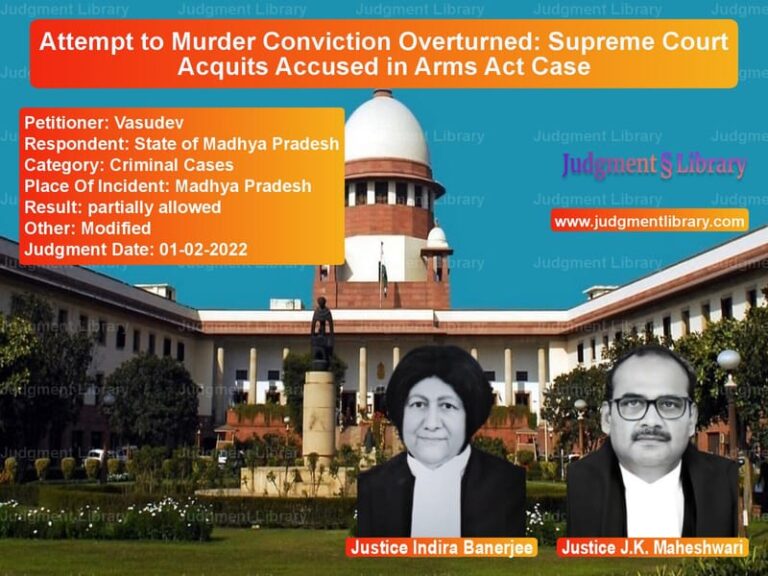Dowry Death Conviction Overturned: Charan Singh Acquitted by Supreme Court
The Supreme Court of India recently ruled on a crucial case involving dowry death allegations, setting aside the conviction of Charan Singh, who had been sentenced under Sections 304B, 498A, and 201 of the Indian Penal Code (IPC). The case highlights significant issues related to the presumption of dowry death, the necessity of evidence proving cruelty before death, and the burden of proof on the prosecution.
Charan Singh, the appellant, was initially convicted for the alleged murder of his wife, Chhilo Kaur, based on accusations of harassment and dowry demands. The prosecution claimed that Chhilo Kaur was subjected to cruelty due to demands for a motorcycle and land and was ultimately strangled to death by her husband and in-laws. The trial court sentenced Charan Singh to ten years of rigorous imprisonment under Section 304B IPC, two years under Section 498A IPC, and two years under Section 201 IPC.
Background of the Case
The appellant and the deceased were married in 1993. Two months after the marriage, Chhilo Kaur allegedly informed her father, Pratap Singh, that her in-laws were demanding a motorcycle. Over time, the demand extended to land as well. According to the prosecution, on June 22, 1995, she was killed due to the non-fulfillment of these demands, and her body was cremated without informing her parents. Upon learning of her death, her father lodged a police complaint.
Trial Court and High Court Rulings
The trial court found Charan Singh and his family members guilty under Sections 304B, 498A, and 201 IPC. However, upon appeal, the High Court of Uttarakhand acquitted his brother and mother but upheld Charan Singh’s conviction, reducing his sentence under Section 304B IPC from ten years to seven years.
Key Arguments by the Appellant
Charan Singh’s counsel argued that the conviction lacked legal basis because the prosecution failed to prove that the deceased had been subjected to cruelty or harassment “soon before her death.” The defense emphasized that:
- No witness testified that the deceased was harassed for dowry immediately before her death.
- Her maternal grandmother and uncles, who lived nearby, did not report any harassment.
- One crucial witness, Jagir Singh, who allegedly informed the complainant about the death, was not produced in court.
- The deceased had a history of seizures, which could have led to her sudden death.
Prosecution’s Counterarguments
The prosecution contended that:
- The deceased was killed within two years of marriage.
- She was cremated without informing her parents, raising suspicion.
- Injury marks and broken teeth on her body indicated violence.
- The family members of the deceased were threatened and thus refrained from lodging a complaint immediately.
Supreme Court’s Ruling
The Supreme Court analyzed Sections 304B and 498A IPC and Section 113B of the Indian Evidence Act, which allows for a presumption of dowry death when a woman dies unnaturally within seven years of marriage and has been subjected to cruelty before her death. However, for this presumption to apply, there must be clear evidence of cruelty or harassment “soon before death.”
The Court concluded that the prosecution failed to establish these essential elements. It noted that:
- There was no evidence of harassment or cruelty just before the deceased’s death.
- The key witness who informed the complainant was not examined.
- The deceased’s close relatives, who attended her funeral, did not report any suspicions.
- The evidence regarding dowry demands was vague and lacked specific instances of cruelty.
The Court emphasized that mere unnatural death within seven years of marriage is insufficient to convict under Section 304B IPC. It ruled:
“The pre-requisites to raise presumption under Section 304B IPC and Section 113B of the Indian Evidence Act having not been fulfilled, the conviction of the appellant cannot be justified.”
Consequently, Charan Singh’s conviction was overturned, and he was acquitted of all charges.
Conclusion
This judgment underscores the importance of proving cruelty or harassment soon before death in dowry-related cases. While the law provides a presumption of guilt in such cases, the burden remains on the prosecution to establish these critical elements. The Supreme Court’s ruling reaffirms that mere suspicion or the fact that a woman died within seven years of marriage cannot be the sole basis for conviction under Section 304B IPC.
Petitioner Name: Charan Singh @ Charanjit Singh.Respondent Name: The State of Uttarakhand.Judgment By: Justice Abhay S. Oka, Justice Rajesh Bindal.Place Of Incident: Bhogpur Dam, Uttarakhand.Judgment Date: 20-04-2023.
Don’t miss out on the full details! Download the complete judgment in PDF format below and gain valuable insights instantly!
Download Judgment: charan-singh-@-chara-vs-the-state-of-uttarak-supreme-court-of-india-judgment-dated-20-04-2023.pdf
Directly Download Judgment: Directly download this Judgment
See all petitions in Dowry Cases
See all petitions in Suicide Cases
See all petitions in Bail and Anticipatory Bail
See all petitions in Judgment by Abhay S. Oka
See all petitions in Judgment by Rajesh Bindal
See all petitions in allowed
See all petitions in supreme court of India judgments April 2023
See all petitions in 2023 judgments
See all posts in Criminal Cases Category
See all allowed petitions in Criminal Cases Category
See all Dismissed petitions in Criminal Cases Category
See all partially allowed petitions in Criminal Cases Category

